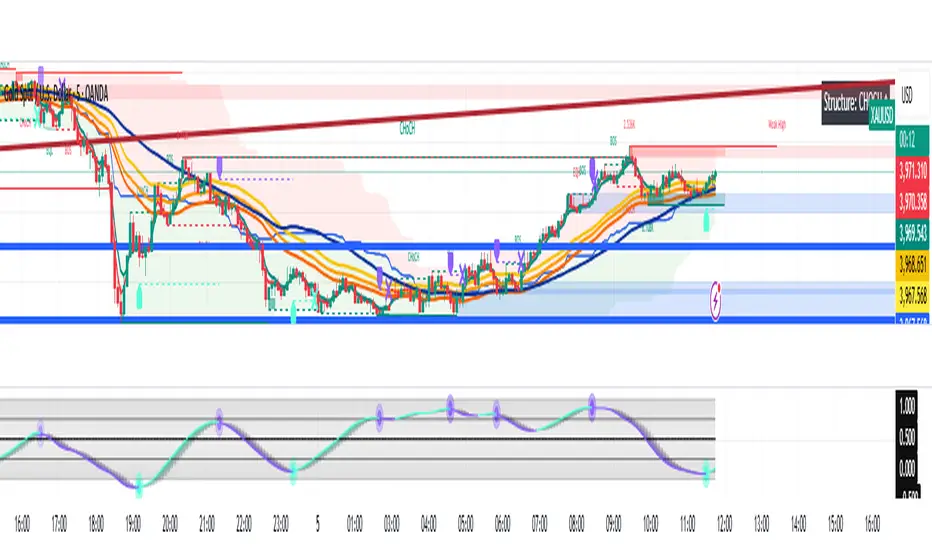OPEN-SOURCE SCRIPT
SMC Smart Money Concepts [GPT-5] SRK

What Smart Money Concepts (SMC) Means
Smart Money Concepts aim to analyze price action and market structure to identify where large players are likely entering or exiting trades.
It’s based on the idea that markets move because of liquidity and institutional order flow, not just technical indicators.
🔹 Core Principles of SMC
Market Structure – Identify trends, highs/lows, and shifts (BOS = Break of Structure, CHoCH = Change of Character).
Liquidity – Understand where stop losses accumulate (above highs or below lows) — these are zones institutions target.
Order Blocks (OBs) – Candles or zones where institutional buying or selling likely originated.
Fair Value Gaps (FVGs) – Imbalances in price where there was no trading activity; price often returns to fill these.
Premium & Discount Zones – Using Fibonacci or structural levels to determine optimal buy (discount) and sell (premium) areas.
Mitigation & Re-entry – Smart money often re-enters positions to “mitigate” previous orders.
🔹 Why Traders Use SMC
To align with institutional order flow instead of retail sentiment.
To improve precision in entries/exits (fewer trades, higher RR).
To understand why price moves, not just how.
🔹 Example
If EUR/USD is trending down, an SMC trader might:
Wait for liquidity sweep above a recent high (where retail traders put stop losses).
Spot a bearish order block.
Enter a sell trade once structure breaks lower (BOS), aiming for liquidity below a recent low.
Smart Money Concepts aim to analyze price action and market structure to identify where large players are likely entering or exiting trades.
It’s based on the idea that markets move because of liquidity and institutional order flow, not just technical indicators.
🔹 Core Principles of SMC
Market Structure – Identify trends, highs/lows, and shifts (BOS = Break of Structure, CHoCH = Change of Character).
Liquidity – Understand where stop losses accumulate (above highs or below lows) — these are zones institutions target.
Order Blocks (OBs) – Candles or zones where institutional buying or selling likely originated.
Fair Value Gaps (FVGs) – Imbalances in price where there was no trading activity; price often returns to fill these.
Premium & Discount Zones – Using Fibonacci or structural levels to determine optimal buy (discount) and sell (premium) areas.
Mitigation & Re-entry – Smart money often re-enters positions to “mitigate” previous orders.
🔹 Why Traders Use SMC
To align with institutional order flow instead of retail sentiment.
To improve precision in entries/exits (fewer trades, higher RR).
To understand why price moves, not just how.
🔹 Example
If EUR/USD is trending down, an SMC trader might:
Wait for liquidity sweep above a recent high (where retail traders put stop losses).
Spot a bearish order block.
Enter a sell trade once structure breaks lower (BOS), aiming for liquidity below a recent low.
オープンソーススクリプト
TradingViewの精神に則り、この作者はスクリプトのソースコードを公開しているので、その内容を理解し検証することができます。作者に感謝です!無料でお使いいただけますが、このコードを投稿に再利用する際にはハウスルールに従うものとします。
免責事項
これらの情報および投稿は、TradingViewが提供または保証する金融、投資、取引、またはその他の種類のアドバイスや推奨を意図したものではなく、またそのようなものでもありません。詳しくは利用規約をご覧ください。
オープンソーススクリプト
TradingViewの精神に則り、この作者はスクリプトのソースコードを公開しているので、その内容を理解し検証することができます。作者に感謝です!無料でお使いいただけますが、このコードを投稿に再利用する際にはハウスルールに従うものとします。
免責事項
これらの情報および投稿は、TradingViewが提供または保証する金融、投資、取引、またはその他の種類のアドバイスや推奨を意図したものではなく、またそのようなものでもありません。詳しくは利用規約をご覧ください。